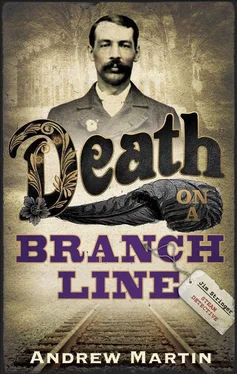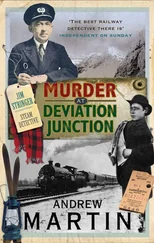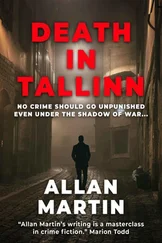Andrew Martin - Death on a Branch line
Здесь есть возможность читать онлайн «Andrew Martin - Death on a Branch line» весь текст электронной книги совершенно бесплатно (целиком полную версию без сокращений). В некоторых случаях можно слушать аудио, скачать через торрент в формате fb2 и присутствует краткое содержание. Жанр: Классический детектив, на английском языке. Описание произведения, (предисловие) а так же отзывы посетителей доступны на портале библиотеки ЛибКат.
- Название:Death on a Branch line
- Автор:
- Жанр:
- Год:неизвестен
- ISBN:нет данных
- Рейтинг книги:5 / 5. Голосов: 1
-
Избранное:Добавить в избранное
- Отзывы:
-
Ваша оценка:
- 100
- 1
- 2
- 3
- 4
- 5
Death on a Branch line: краткое содержание, описание и аннотация
Предлагаем к чтению аннотацию, описание, краткое содержание или предисловие (зависит от того, что написал сам автор книги «Death on a Branch line»). Если вы не нашли необходимую информацию о книге — напишите в комментариях, мы постараемся отыскать её.
Death on a Branch line — читать онлайн бесплатно полную книгу (весь текст) целиком
Ниже представлен текст книги, разбитый по страницам. Система сохранения места последней прочитанной страницы, позволяет с удобством читать онлайн бесплатно книгу «Death on a Branch line», без необходимости каждый раз заново искать на чём Вы остановились. Поставьте закладку, и сможете в любой момент перейти на страницу, на которой закончили чтение.
Интервал:
Закладка:
‘You haven’t had a letter from Franklin, have you, sir?’ Gifford asked him. ‘The bloke that lives in Islington?’
‘I’ve had no letters at all,’ said the vicar, pulling the object from the cloth bag in his hand.
It was a red miniature locomotive that he held, and the sight came as a let-down to me. I’d pictured some species of weaponry, something devilish and German.
‘That’s jolly,’ said the vicar, contemplating the little engine. But he didn’t sound over-enthusiastic.
Gifford said, ‘It supersedes the…’
(I couldn’t catch the final word.)
The vicar put the engine into its cloth bag and took out another, from a second bag.
Gifford leant over and said, ‘Valve and valve gear that work properly, you’ll see, sir.’
He was an ordinary salesman, and the vicar nothing more to him than a likely — though not, as it appeared, a very likely — customer. Gifford had had an appointment to see the vicar, and had been anxious that a fellow called Franklin, apparently a business rival of his, had an appointment for about the same time, and he had thought that I was Franklin. He had not believed my denial and had then (finding the door unlocked) walked into my room and hunted through the drawers in the bureau in hopes of discovering my true identity. He’d have had a shock when he saw the warrant card and found out I was a copper. He’d have left that room at a lick.
We were wasting our time. It was the man in field boots that really mattered. Was the murder already done? Had he put John Lambert’s lights out immediately on discovering him? I did not think it would work like that. There would be some parley or negotiation to begin with, and I was thrown back on hoping this would somehow carry on until the Chief pitched up.
In the summerhouse, Gifford was recommending another of the engines to the vicar, who now seemed thoroughly bored.
‘Looks well, doesn’t it?’ Gifford said. ‘I’ve seen nothing to match it in the “O” gauge.’
It was not his part, as the seller, to be saying that. The vicar ought to be saying it. Instead he gave a glance towards the woods, and I met his eye for an instant. But he saw only a couple spooning under the trees — rather too close to his property perhaps, but harmless anyhow. He was a burly man with a rough-skinned red face. He had a summery look: neatly pressed white suit, and the shirt under his white collar was sky blue. The sun was not good for him: it burned his skin, but he took it full in the face all the same. He would drink a good deal of wine, and it would be fine wine. He had what I believe they call in the church ‘a good living’ and he did himself well. Or other people did well for him.
Lydia had already given up on the scene within the summerhouse, and turned her back on it; she was resting against the railing and eyeing me, as if to say, ‘Have you cottoned on yet? This is a false trail.’
The vicar was saying, ‘Taken all in all, I think I’ll let these go.’
Gifford’s long journey north had been for naught, and I admired the way he gulped down his disappointment.
‘Will you not take just the little one, sir? The red single-driver? Have it on approval for a month, sir. Return it by post if not completely delighted.’
But under the heavy gaze of the vicar, he was already packing his bag.
‘Want to go back round the front?’ the wife said. ‘Catch him coming out?’
‘Why?’
And she shrugged while picking at a dandelion.
We did it anyway, avoiding the garden this time, but cutting along towards the graveyard by means of a narrow snicket that led between two of the cottages.
‘Lovely country,’ Gifford was observing at the front of the vicarage, as he said goodbye to his host. His words were almost drowned out by birdsong, but he hadn’t given up on the niceties, for all his disappointment. His behaviour towards the vicar reminded me of mine towards the man in the field boots.
‘Lovely garden too, sir,’ said Gifford.
‘It might be moderately agreeable, I suppose,’ said the vicar, ‘if the head gardener gave it half a chance. He will insist on planting out far too high a percentage of late-flowering… But you don’t want to hear my troubles, Gifford!’
And he clasped the salesman’s hand, saying, ‘Pleasant journey back, now!’
Gifford stepped into the lane that stood between the vicarage and the graveyard, and gave a start of surprise when he saw the two of us lounging there, no doubt recalling in that instant his secret visit to our room.
‘You’re the pair from The Angel, ain’t you?’
I could see the sweat leaking out from over his stand collar.
‘We’ve just taken a stroll around the back,’ I said. ‘… Saw you chatting to the parson, and couldn’t help over-hearing a bit.’
‘Not a lot to bloody well hear,’ said Gifford in a glum tone.
‘Came out badly, did it?’
‘Don’t it always?’ replied Gifford, and he removed his brown bowler to mop his brow. He had not made his sale, and he was stifled besides. His centre parting looked like a guide-line for a saw. His moustache was also arranged in two halves. The man was a martyr to his fine-toothed comb.
‘I travel in model locomotives,’ he said. ‘You might think that’s a pretty good joke?’
And he looked at us expectantly.
‘But I ain’t seen the funny side in years — not in years.’
We had entered the graveyard, and come to a stop by Sir George’s grave.
Gifford was saying, ‘Steam-powered, electrical and spring-motor mechanism — well, that’s clockwork, if you must know. But it’s all a bloody mug’s game, pardon my French, lady. He’s one of the biggest collectors in the whole country,’ Gifford continued, indicating the vicarage. ‘“Well worth a visit to Reverend Ridley,” I was told. “Makes a purchase every time. Never misses.”’ He shook his head. ‘Calls himself a vicar… Christian thing would’ve been to buy the little red loco. Brass boiler, steel frames. Double action piston valve cylinders with reversing motion worked from cab. All wheels to scale throughout.’
Gifford stepped back from the grave, and his boot-heel went into some fresh sheep dung.
‘Who let a bloody cow in here?’ he said, and I hadn’t the heart to put him right. ‘Bloody cattle!’ he said, looking down. ‘They do make a litter. I’ll be bloody glad to be leaving this ’ole, I can tell you.’
I looked towards the vicarage, where the Reverend Ridley was standing at one of the ground-floor windows, watching us with folded arms.
‘Have you two heard of his layout, by the way?’ Gifford continued in a lower voice, as though he felt the vicar might be able to hear him. ‘Famous, it is — been photographed in all the railway papers. It’s in his dining room I believe, though the pill wasn’t about to show me it, and I hadn’t the nerve to ask. King’s Cross and environs in one and a quarter inch to the foot. Shown in the rush hour, the Cross is. Hundreds of little lead people charging about all over the shop — well, they’re not charging; they’re completely fixed, but that’s the effect. Thing is, being a parson, he’s rotten with money and ain’t got anything else to do.’
‘Except save the souls of the villagers,’ said the wife, who was one of the religious sort of feminists, and set a lot of store by the behaviour of vicars.
‘Do leave off, lady,’ said Gifford.
‘You have a line in German models?’ I said.
Gifford pulled at his collar.
‘The best models today are German,’ he said. ‘You’ll generally find with your German models the smoke-box door will be made open-able. Little touches like that. It’s in the finishing too, of course. The enamelling and lining is always of the first order. But try telling him that!’
Читать дальшеИнтервал:
Закладка:
Похожие книги на «Death on a Branch line»
Представляем Вашему вниманию похожие книги на «Death on a Branch line» списком для выбора. Мы отобрали схожую по названию и смыслу литературу в надежде предоставить читателям больше вариантов отыскать новые, интересные, ещё непрочитанные произведения.
Обсуждение, отзывы о книге «Death on a Branch line» и просто собственные мнения читателей. Оставьте ваши комментарии, напишите, что Вы думаете о произведении, его смысле или главных героях. Укажите что конкретно понравилось, а что нет, и почему Вы так считаете.











